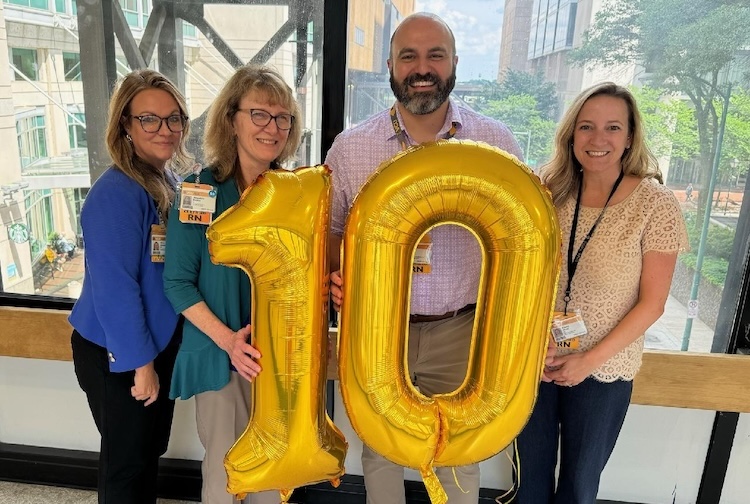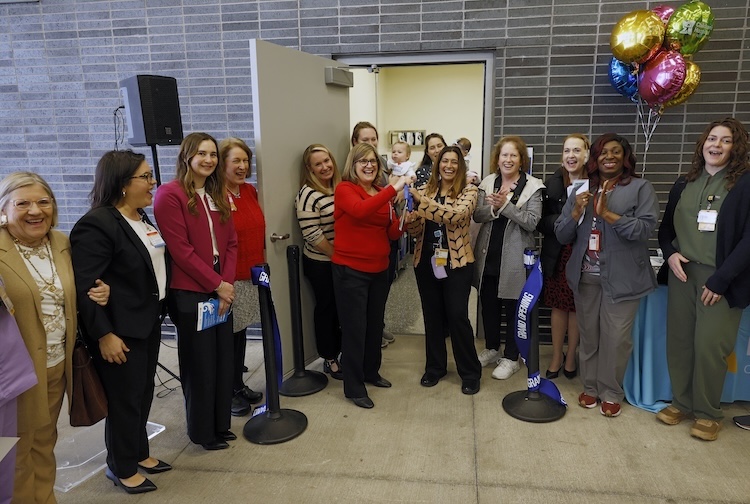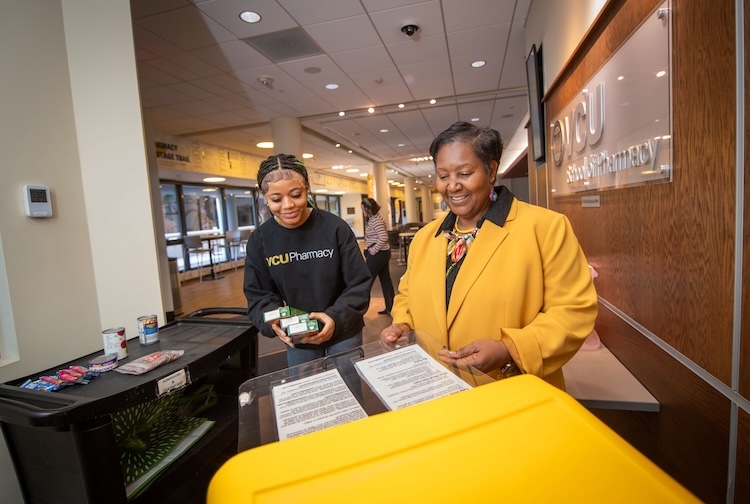An innovative residency program is helping new nurses thrive well beyond their first years on the job
A look inside the partnership between VCU School of Nursing and VCU Health that’s shaping the future of nursing.
June 04, 2025 Marking a milestone in 2024, VCU Health celebrated 10 years as a Commission on Collegiate Nursing Education-accredited program. This achievement underscores the organization’s commitment to excellence in nursing education, with the employee-based nurse residency program serving as a cornerstone of professional development. (VCU School of Nursing)
Marking a milestone in 2024, VCU Health celebrated 10 years as a Commission on Collegiate Nursing Education-accredited program. This achievement underscores the organization’s commitment to excellence in nursing education, with the employee-based nurse residency program serving as a cornerstone of professional development. (VCU School of Nursing)
By Caitlin Hanbury
From working your first overnight shift to managing high stakes situations while caring for patients, transitioning from a nursing student to practicing clinician can be overwhelming.
To ease this process, nurse residency programs provide a structured support system, helping new graduates bridge the gap between academic training and the realities of clinical practice.
At VCU Health, a powerful partnership with Virginia Commonwealth University School of Nursing has been instrumental in shaping the careers of new graduates as they step into the high-stakes first year of their nursing job.
“I remember being overwhelmed, given the high stress and demands of my unit, but hearing Jacqui [Broyles] and my fellow nurse residents reflect on their own struggles gave me insight that I greatly appreciated,” said Sara Townsend Wechsler, a nursing professional development specialist at VCU Health who completed the VCU Health Nurse Residency Program in 2005. “The nurse residency provided a supportive environment and opportunities to increase my knowledge, skills and abilities, fostering long-term career growth.”
These types of programs are a launchpad for nurses’ careers, but what has set the VCU Health Nurse Residency Program apart from others of its kind is its deep, close connection to the School of Nursing. Faculty from the school have played an active role in developing and sustaining the program for more than 20 years, serving as liaisons and academic partners in a model that now spans the full health system.
The Nurse Residency Program also builds the foundation for both professional growth and personal resilience – helping new nurses develop the confidence they need to thrive and become leaders in the field.
Developing a program geared toward long-term success
The origins of the Nurse Residency Program trace back to the MCV-VCU Nurse Intern Program, a yearlong transitional support model that ran from 1970 to 1993. One of those interns was Jacqueline “Jacqui” Broyles, who is now the Nurse Residency Program’s longtime coordinator. Her experience as a nurse intern helped her understand the value structured support can make. In 2001, she accepted a position that eventually evolved into the Nurse Residency Program coordinator title she holds today.
In 2004, VCU Health launched the program in its current form. Devised in collaboration with the VCU School of Nursing, it was intended to be more than just an onboarding process for graduates transitioning into practice — it was a long-term investment in their growth, resilience and clinical excellence.
We plant seeds of empowerment and advocacy and watch them grow as former residents continue to provide excellent care and with a spirit of inquiry, continue to ask questions and drive practice changes.
Jacqueline Broyles, MSN, RN, NPD-BC, VCU Health Nurse Residency Program coordinator
The program drew from national best practices and was among the early adopters participating in a research initiative led by the University HealthSystem Consortium. Importantly, the partnership also ensured that associate degree and diploma-prepared nurses received parallel support — an uncommon level of inclusivity for that time.
Since then, the Nurse Residency Program has continued to grow in scope and impact. It achieved initial accreditation from the Commission on Collegiate Nursing Education in 2014 and again in 2019, culminating in a 10-year accreditation in 2024.
“We see the impact of the program on the organization culture with its emphasis on clinical inquiry, safety, quality and collaboration as so many VCU Health nurses have completed the program,” Broyles said. “We plant seeds of empowerment and advocacy and watch them grow as former residents continue to provide excellent care and with a spirit of inquiry, continue to ask questions and drive practice changes.”
Anatomy of a nurse residency
Each year, four groups of residents participate in monthly seminars — some in-person, some virtual — that guide them through themes like patient safety, care delivery, role development and clinical inquiry.
What makes the program particularly unique is its focus on building relationships and creating a sense of belonging. Residents develop their technical skills while also learning about leadership, advocacy, and how to think about systems through hands-on projects that address real priorities within the organization.
"The Nurse Residency Program really provided a safe outlet for me to bond with my peers and learn in a low-pressure environment about the resources available at VCU," said Peyton Jones, assistant nurse manager in the Neuroscience Intensive Care Unit (ICU) at VCU Health, who completed the program in 2019. "It helped me grow on a personal level as well as grow in my relationships with others on my unit and gave me more confidence in my bedside care as I was able to tackle issues and find solutions faster."
The Nurse Residency Program has done more than support new nurses — it’s helped shape the leadership pipeline at VCU Health, with many former residents now serving in key roles across the system. The program has been instrumental in the career development of many graduates, providing them not only with technical expertise but also with leadership opportunities.”
“The program provided me with tools and a safe space to reflect on my own practice as well as nursing critical care practice generally. The tools for and practice of self-reflection are the most impactful skills I took from my time in the Nurse Residency Program,” said Heather Fudala, Ph.D., RN, CCRP, program director of Nursing Research and Innovation at VCU Health. “Reflection is a fundamental step to improving not only my own practice but improving nursing practice generally. As the first step in clinical inquiry, it grounds everything I do as a nurse to improve the health, wellness, and outcomes for patients, team members, and the communities we serve.”
Leaders at the health system have afforded me countless opportunities for growth, and I believe opening doors for the next generation of nurses by forming professional connections and creating new ways of thinking are just one way we can continue to pay it forward.
Keith Wick, M.S.N., RN, NPD-BC, VCU Health Nurse Residency Program coordinator
Similarly, Dale Wright, D.N.P., RN, CNS, ACNS-BC, PCCN, director of Nursing Practice and Quality at VCU Health, credits the program for shaping her approach to evidence-based practice and leadership.
“The program’s emphasis on evidence-based practice and data-driven decision-making shaped the way I approach nursing," Wright said. "Since then, I’ve continued to use data as a tool to evaluate and enhance care, expanding my view beyond one unit to system-wide metrics and building structures that support clinical excellence across the board."
In 2024, the program marked its 20th anniversary and expanded health system-wide, now serving new nurses at all inpatient and outpatient locations, as well as VCU Health Community Memorial Hospital and VCU Health Tappahannock Hospital. Plans for the future include refining the curriculum and continuing to innovate program evaluation, all with the support of the School of Nursing as a strategic partner.
A model for the future of nursing
In an era when health care systems nationwide are facing challenges with nursing recruitment, retention and burnout, the VCU Health Nurse Residency Program is a model of sustainability and support.
By cultivating a culture of ongoing mentorship, training and career growth support, it brings VCU Health’s core values of compassion, excellence and accountability to life, ensuring new nurses not only thrive but lead.
“The most impactful thing the residency instilled in me was a sense of curiosity. I was so eager to learn everything about nursing and patient care delivery when I began my nursing career, and despite remaining in the same profession I continue to be amazed how I can learn something new every day. The most empowering thing I’ve learned over my time in nursing is how varied the nursing role can be,” said Keith Wick, M.S.N., RN, NPD-BC, VCU Health Nurse Residency Program coordinator. “Leaders at the health system have afforded me countless opportunities for growth, and I believe opening doors for the next generation of nurses by forming professional connections and creating new ways of thinking are just one way we can continue to pay it forward.”
Learn how VCU Health is creating opportunities in our workforce
A version of this story was originally published by VCU School of Nursing




